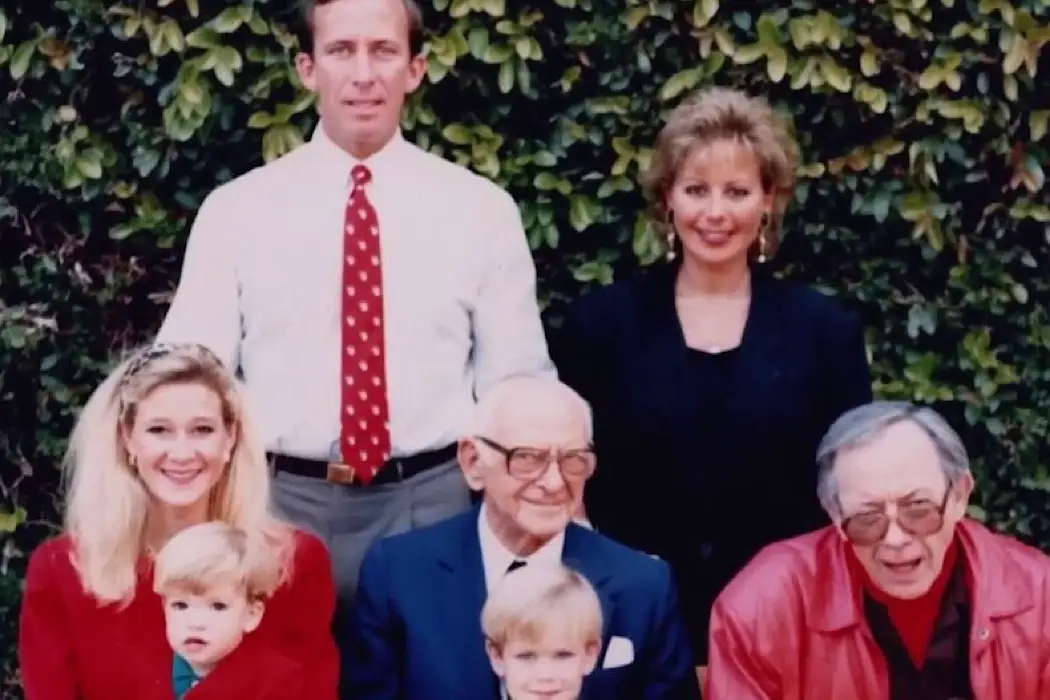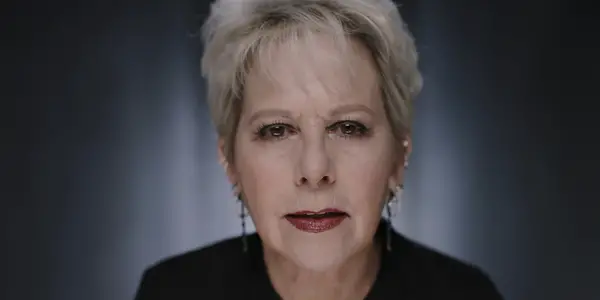HOUSE OF HAMMER Review: Cycles of Power, Cycles of Violence

Payton McCarty-Simas is a freelance writer and artist based in…
From the first few minutes, House of Hammer makes it very clear that this story isn’t really about Armie Hammer. The new Discovery+ limited series about the grim accusations of sexual and emotional abuse against Call Me by Your Name star Armie Hammer tells the story of how Armie went from a rising Hollywood leading man to box office poison by way of about a billion cannibal memes (one of his most infamous DMs reads: “I’m 100% a cannibal” and references to anthropophagy don’t stop there) and a criminal sexual assault investigation. It’s one of the most salacious Hollywood gossip stories to ever hit the internet. Yet, in the media fracas, the women who were brave enough to come forward were harassed, disbelieved, and overlooked in the familiar cycle of internet tabloid culture that favors shock value over victims of sexual abuse.
While occasionally failing to overcome the titillating timbre of the internet gossip ecosystem from which the story sprang, House of Hammer‘s project is to re-centralize the voices of the women who were harmed not only by Armie Hammer, but by multiple generations of the Hammer family’s men. Over the course of the series’ three episodes, House of Hammer paints a portrait of a decades-long cycle of abuse from the voices of the women who were trapped within it as well as those who helped them to finally break it. However, with four generations of dynastic struggle and flamboyantly diabolical men to keep track of, on top of the complex minutia of the central Armie saga itself, the show frequently gets lost in its own web of eye-popping revelations that span just about every topic from “sex thrones” to Watergate. Yet, House of Hammer does treat its subjects with respect, ultimately demonstrating the ways in which Armie Hammer‘s story is a universal example of how money and power create and perpetuate the violence of the hetero-patriarchy to the detriment of everyone involved.
“Destroy Her Will”
The Armie Hammer sex scandal broke in January 2021 when an anonymous Instagram account called @houseofeffie posted a series of screenshots showing sexually violent and disturbing conversations between the actor and herself. The screenshots immediately went viral for their explicit discussions of Hammer‘s desire to rape her, drink her blood, and sexually cannibalize her. In the aftermath, Courtney Voucekovich, a Dallas-based small business owner, Instagram influencer, and ex-girlfriend of Hammer‘s, vouched for the veracity of the messages based on her own experiences with the actor–– and began speaking out herself. Soon, other exes came forward and Effie herself released a harrowing video directly accusing Hammer of rape, quickly leading to the opening of a sexual assault investigation against the actor (the investigation is still ongoing and Hammer has denied all allegations). The ensuing scandal consumed the internet for weeks, generating a barrage of crass cannibal memes, SNL sketches, and TikTok accounts dedicated to feeding the gossip. Courtney in particular takes time in the show to emphasize the degree to which the focus on the cannibalism element of the story did a disservice to herself and the other survivors, whose experiences became meme-fodder. The women who came forward were also subjected to online harassment by Armie Hammer‘s fans (“Charmies”) and lawyers in a manner now reminiscent of the smear campaign against Amber Heard in the Depp-Heard trial, the recent #MeToo case that brought out similarly ugly misogyny in the media/internet landscape. Hammer’s career though, unlike Depp’s, has suffered and he was pulled from multiple productions as a result of the allegations.
The show begins with Courtney Vucekovich describing her whirlwind romance with Hammer that began during the early lockdown days of the COVID-19 pandemic. The two exchanged alternatingly raunchy and romantic DMs on Instagram and eventually met in person, sparking a relationship. Her story is intercut with an interview with Julia Morrison, an artist, and model who began receiving DMs from the star around the same time. A pattern quickly begins to emerge between the two stories: Hammer flattered the two women, slowly transitioning into discussions of rope bondage and BDSM that neither woman was comfortable with. Vucekovich recounts stories from her relationship, detailing how it devolved from weeks-long road trip vacations to stalking and nonconsensual sexual encounters that she leaves for the most part undetailed. Hammer is further characterized by stories from former acting classmate Ryan Bailey who describes him as having a pedigreed background he preferred not to discuss (that was rumored to have helped him land his breakout role as the uber-wealthy Winklevoss twins in The Social Network [2010]), and an anonymous former employee who describes how the actor used his wealth and status to bully and manipulate him.

As the show progresses, the domineering and manipulative psychology demonstrated in anecdotes about the actor is slowly unpacked by the two women who helped popularize the story on social media, internet personalities and amateur sleuths Lauren Skae (@thezenblonde) and Candace Cronkite (@bbfbravo). (The show’s stance on the internet is somewhat muddled, coming across as incredibly credulous of the positive power of social media, even in light of the online harassment it details–– to its detriment.) Skae in particular describes her discovery that Armie‘s aunt, Casey Hammer, had written a memoir, Surviving My Birthright, in 2015. As she read the book, which details the past crimes, abuses, and indiscretions of three generations of Hammer men, she began posting summaries on TikTok. Casey Hammer herself is interviewed extensively for the show along with Cathe Boal, (her father, Julian Hammer‘s former fiancé). Together, the two women’s interviews untangle a drug-crazed, violent, wildly hedonistic web of intergenerational misogyny (in Cathe’s words, Julian was “the Hugh Heffner of Pacific Palisades”) that led to a uniform, abusive treatment of women as mindless sex toys and “housekeepers” (often both, and often underage). One reporter, Edward Epstein, who profiled Armand Sr. in the 1970s and later wrote a book about him, describes court documents in which Armand‘s second wife, Angela, tells the judge in their divorce proceedings that Armand was physically and mentally abusive, working to “destroy her will,” a turn of phrase chillingly paralleled by Courtney earlier in episode one and echoed by Paige Lorenze, another accuser and former girlfriend of Armie‘s.
“Magnify Succession a Million Times…”
At this point, the show begins to expand outward and loses track of some of its threads, relying on a haphazard animated graphic of the Hammer family tree to ground its timeline to poor results. The stories Casey tells are all indeed incredibly shocking. They paint a portrait of a family that is Succession “magnif[ied] a million times” whose members are indeed out of control and hungry for power in all its myriad forms. Sex, drugs, wild parties, graft, and abuse of all sorts abound. And while finding out that oil tycoon Armand Hammer Sr.‘s father, Julius, was a KGB spy and one of the founders of the American Communist Party (Armand Hammer Sr. was, says one reporter, named for the “arm and hammer” Communist insignia) makes for absolutely riveting television, they do little to amplify the film’s larger message of supporting intimate partner violence survivors. This flaw is understandable given the irresistible pull of each anecdote, and while these asides are a detriment to any semblance of narrative structure (they take on an almost random, sporadic quality as we rush frantically back and forth on the animated timeline with little regard for coherent themes or organization), the overall tenor is one of jaw-dropping incredulity that parallels the viewer experience and is hard to resist. Narratively scattered or not, the show’s focus on the disregard for human life and dignity that characterizes each man in the family does work to flesh out Armie Hammer not as an individual but as a product of a family corrupted by owning the sixteenth largest company in the world and all the unparalleled political and financial power that came with it, indicting monarchs, multiple world leaders, and Hollywood in the process.

The final episode wraps up the stories of each Hammer man individually before returning to Courtney, Paige, and Julia‘s accounts of the gruesome violence to which they were subjected. A BDSM educator, Dr. Damiana Chi, and Effie‘s defense lawyer, Gloria Allred, do a thorough job of dismissing claims that the accusations were simply misconstruing a healthy BDSM relationship for abuse in no uncertain terms: “Even within BDSM relationships, consent is still at the heart of it. If she withdraws her consent and he continues–– that’s a crime. Simple as that. Kinky is not against the law. Rape is. Simple as that,” says Allred, followed by Dr. Chi, simply stating, “That’s not a kinkster, that’s an abuser.”
Conclusion:
For all its muddled passages and its soft spot for the salacious, the ultimate conclusion of House of Hammer can be compellingly summarized by something Julia Morrison says in the final episode: “Cancel culture is way more on people’s tongues than rape culture, and rape culture is a way bigger issue. And cancel culture wouldn’t exist if rape culture wasn’t such a big thing.” Though Hammer has already attempted one unsuccessful comeback with Death on the Nile (2022), as an article cited in the final minutes of the show suggests, in our cultural landscape, “no comeback is impossible.” The show serves as a post-#MeToo warning about the continued dangers of all the things that defined the major predators exposed by the Hollywood #MeToo movement in particular–– money, fame, power, success, influence, and the entrenched ability of each of these things to help men get away with murder. Each woman was drawn in by Armie‘s charm, his attention, and the feeling, built into our culture, that his progressively-more-threatening advances should be taken as flattering due to his stardom until the damage was already done.

Beyond just the Hammers themselves, though, the show indicts the hetero-patriarchal capitalist system that creates the power dynamics which facilitate the kinds of entitled, violent behaviors that cause so much pain. The show posits that the only way to break this cycle is through learning how to recognize these patterns of abuse and misogynist entitlement and support their victims. As Casey puts it, “How do you know what’s wrong when that’s all you know?” The same question could be asked of each of the players in this nearly century-long story, the men, the women, the children. And the answer is you can’t––patterns have to be recognized to be broken.
What do you think? Let us know in the comments!
All three episodes of House of Hammer are available to stream on Discovery+
Does content like this matter to you?
Become a Member and support film journalism. Unlock access to all of Film Inquiry`s great articles. Join a community of like-minded readers who are passionate about cinema - get access to our private members Network, give back to independent filmmakers, and more.
Payton McCarty-Simas is a freelance writer and artist based in New York City. They grew up in Massachusetts devouring Stephen King novels, Edgar Allan Poe stories, and Scooby Doo on VHS. Payton holds a masters degree in film and media studies from Columbia University and her work focuses on horror film, psychedelia, and the occult in particular. Their first book, One Step Short of Crazy: National Treasure and the Landscape of American Conspiracy Culture, is due for release in November.












